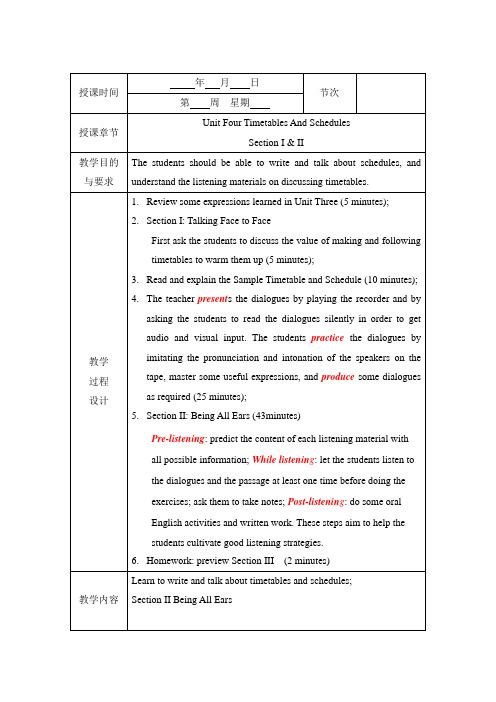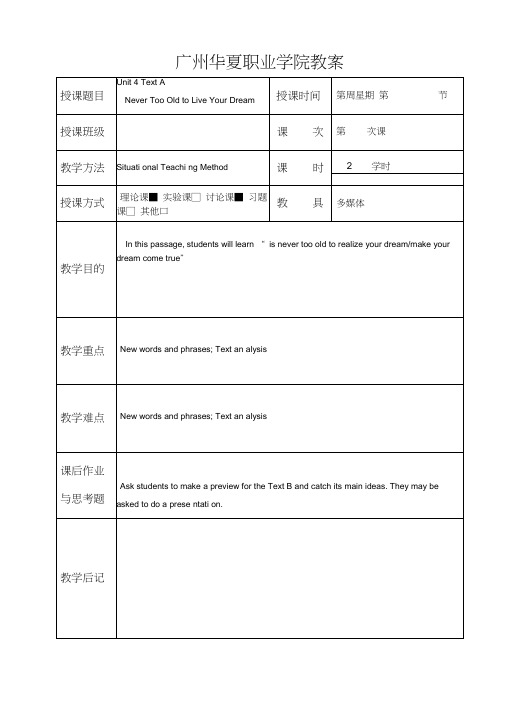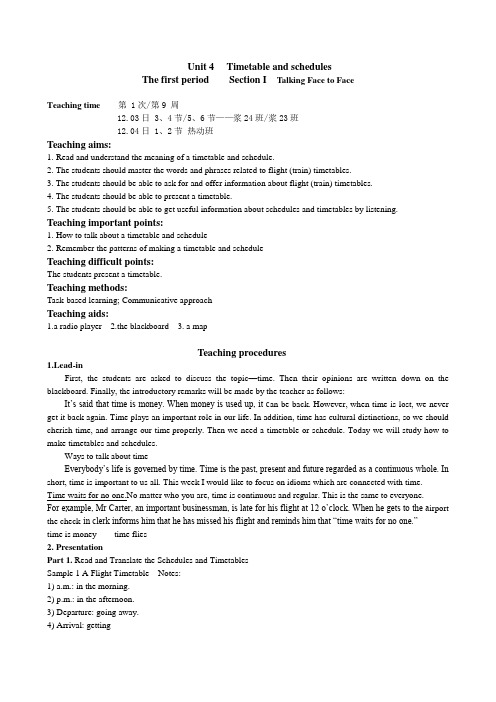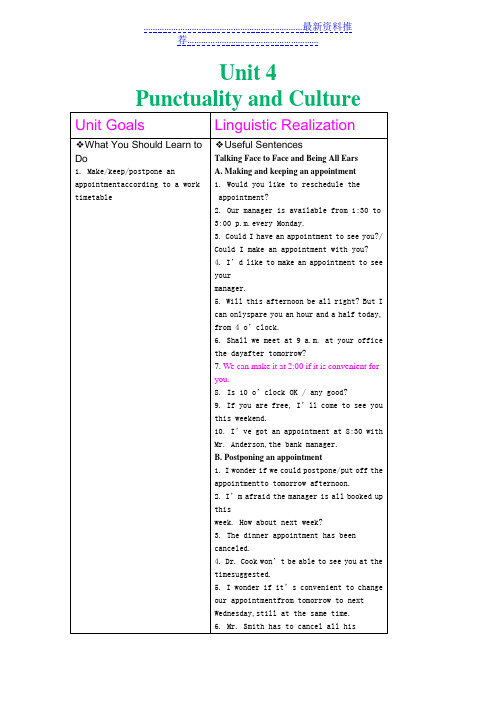新编实用英语电子教案unit4
新编实用英语综合教程2-unit4hotelservice教案

Unit 4 Hotel ServicesUnit GoalsWhat you should learn to do1.Book a hotel room and services2.Check in /out at a hotel3.Fill in a reservation form4.Fill in a room reservation cardWhat you should know about1.Hotel services in the USA2.Relative clauseSection I Talking Face to Face1.Imitating Mini-Talks2.Acting out the Tasks3.Studying Email Information on the Internet4.Following Sample Dialogues5.Putting Language to UseSection II Being All Ears1.Learning Sentences for Workplace Communication2.Handling a Dialogue3.Understanding a Short Speech / TalkSection III Trying your Hand1.Practicing Applied Writing2.Writing Sentences and Reviewing GrammarSection IV Maintaining a Sharp EyePassage 1 :Information Related to the Reading Passage1. Kinds of hotels in the United States:Places to stay for a short time may be called hotels, hostels, motels or motor hotels, inns, lodges or resorts. Hostels, also referred to as youth hostels, are often for students working away from home. Motels have plenty of parking space and are usually near a freeway or highway. Inns are usually like motels. Lodges and resorts, or resorts hotels, are in the mountains, on the coast, or near lakes.2. Kinds of beds:Beds go by many different names. Starting with the smallest, there are single, twin, double, queen and king size ones. “Long boys” are for exceptionally tall people. At some hotels, queen beds are the smallest size used, so a double room has two of them. Some hotels even offer their guests waterbeds. A rollaway can be moved into a room to sleep an extra person. Hide-a-beds are sofas that fold out to make beds.Text Welcome to Climer LodgeMiami UniversityOxford, Ohio 45056Welcome to Climer Lodge. We are fortunate to have this beautiful facility to accommodate very special guests from Miami University. In our efforts to serve you, we ask that you note the following:● The resident manager lives in Room 129, near the lobby entrance, and may be reached by dialing 9-5226. Please contact the manager if you have any questions or needs after 5:00 . on weekdays and throughout weekend stays.● On the lower level of Climer you will find an ice machine, a canned beverage machine, a lounge area and kitchenette where coffee and tea anda light continental breakfast are provided.● Lounge Hours:6:00 . to 11:00 . daily. It is a non-smoking atmosphere.● Recreation Center Hours:9:00 . to 10:00 ., Sunday through Thursday. 9:00 . to 11:00 . on Friday and Saturday. No lifeguard is on duty in the swimming pool. Parents are required to be present at all times when children are in the pool. No children are allowed in the sauna.● Check-out time is 10:00 . Upon departure, please leave the key in your room.Phone Instructions:● On-campus calls: Dial only the last 5 numbers. No need to dial the52 prefix.●Local telephone calls: Dial 88, then the 7-digit off-campus number.● AT&T operator-assisted calls (collect, calling card, etc.) —dial 80, the area code(for all long distance calls), then the telephone number.To place an international call: Dial 8+011+Country Code+City Code+Number●EMERGENCY PHONE NUMBER: PUBLIC SAFETY —911 (Police, Fire, Medical)Language Points1 Explanation of Difficult Sentences1. (Para. 1) We are fortunate to have this beautiful facility to accommodate very special guests of Miami University.Analysis: In this sentence the infinitive phrase to have this beautiful facility ...is used as an adverbial of reason, modifying are fortunate.Translation: 我们很荣幸为迈阿密大学尊贵的客人们提供优美的住宿条件。
新编实用英语综合教程1第四版Unit4

4 Task: Look at Mark's schedule in Exercise 3. Ask to make an appointment to see Mark on Wednesday.
5 Task: Look at Mark's schedule in Exercise 3. An old friend in Hong Kong asks to see Mark on Thursday.
Tuesday to Thursday. B: I'm afraid he won't be available on Thursday morning. A: What time would be convenient for him? Will 2 p.m. do? B: Yes, that'll be fine.
Receptionist: There's one on Wednesday, the 17th.
Bob: Good. What's the departure time?
.
11
Receptionist: 8:45 a.m. And the arrival time in Hong Kong is 11:45 in the moUrnniti|nFgo.ur
Sunday we are closed.
5) Asking About the Flights for Macao
A: Do you have flights to Macao?
B: We have only one flight to Macao each week, at 1:40 p.m.
Wednesday.
《新编实用英语I》第四单元教案

步骤Steps:
Give the students a few minutes to read through the printed materials for each listening item.
Listen to the material for the first time without referring to the book.
5.Appreciating Culture Tips.
训练方法:1.头脑风暴,全班同学自主发言
2.个人练习,教师反馈
3.小组活动,教师监督
4.小组合作,情景剧创作表演
思考或作业:针对制定时刻表和工作日程表的各项任务的注意事项进行复习性的思考,分组进行小型操练,要求能根据不同目的制定周或月工作日程表。
任务1:学习工作场所交流时习惯用语和常用句子。
Objective:Sslearn the useful sentences for workplace communication.
目标:学生掌握工作场所交流时习惯用语和常用句子。
步骤Steps:
《新编实用英语》教案第一册Unit4

Unit 4 Timetables And SchedulesI. Objectives:By the end of this unit, the students should be able to1) read and discuss timetables and schedules in English,2) learn some expressions used in making timetables and schedules and write theirown timetables and schedules,3) comprehend the two passages and master the useful expressions in them, and4) finish the exercises by themselves or with some help.II. IntroductionLead-in(导入): First, the students are asked to discuss the topic—time. Then their opinions are written down on the blackboard. Finally, the introductory remarks will be made by the teacher as follows:It’s said that time is money. When money is used up, it can be back. However, when time is lost, we never get it back again. Time plays an important role in our life. In addition, time has cultural distinctions, so we should cherish time, and arrange our time properly. Then we need a timetable or schedule. Today we will study how to make timetables and schedules.III. Teaching Procedures:Section I. Talking Face to FaceStep 1. Presentation:Read the following two schedules and timetablesSample 1 Flight TimetableBeijing---Guangzhou---Hong KongNotes:1) a.m.: in the morning2) p.m.: in the afternoon3) Departure: going away4) Arrival: getting to some placeSample 2Mark’s ScheduleApril, 2002Notes:1) sales meeting: a meeting in which you can buy or sell goods just like trade fair.2) General Manager: a person who controls or manages the wholecompany.Step 2.Practice:Dialogue 1 Talking about a Flight TimetableBob is calling a receptionist for information about flights from Beijing to Hong Kong.Receptionist: CAAC information. Can I help you?Bob: Yes .Is there a flight to Hong Kong on Tuesday, the 16th?R: Yes, there is.Bob: Is that a direct flight?R: No you have to change in Guangzhou.Bob: Oh, how long does it stop over in Guangzhou?R: From 11 to 12.Bob: 11 to 12. That’s almost an hour. Well, I prefer a direct flight.R: I’m sorry, but there’s no direct flight on Tuesday.Bob: What about Wednesday, the 17th.R: There’s one on Wednesday, the 17th.Bob: Good. What’s the department time?R: 8:45 a.m. and the arrival time in Hong Kong is 11 in the morning. Notes:1) CAAC: Civil Aviation Administration of China (中国民航总局)2) Direct flight: the flight that can arrive at the destination directly. It’s also called “though flight”3) Change: get off from one flight then get on another oneQuestions:1) Which flight will Bob take?2) When will Bob arrive in Hong Kong by taking this flight?Dialogue 2 Talking about Mark’s ScheduleJoe: Have you been busy recently?Mark: Yes, and I have a busy schedule this week, too. This morning I need to write a business report and this afternoon at 1:30. I’ll discuss the report withthe general manager.Joe: What’s your schedule for tomorrow?Mark: Tomorrow is Tuesday .I’m attending the sales meeting au 8 inthe morning. And in the afternoon at 3 :00 I’m seeing Mr. Black, themarketing manager.Joe: What about Wednesday?Mark: I’ve got an appointment at 8:30 with Mr. Anderson, the bank manager .In the afternoon I’m taking the 4:45 flight to Hong Kong for the conference.Joe: The conference is on Thursday, right?Mark: Oh, yes, at 10:00 in the morning and 2:00 in the afternoon. After the conference, I’ll be free. I’ll be enjoying my weekend in Hong Kong.Joe: When are you coming back?Mark: I’ll take the 2:15 flight back on Friday afternoonQuestions:1) When is the appointment between Mark and Mr. Anderson?2) When will Mark go back?3) What does Mark do?Step 3. Production:Task: Imagine you are Mark. You are telling your friend Jack about your trip to Beijing. The following dialogue is provided for your reference.Jack: Hi, Mark. What’s your plan for this weekend?Mark: I’m going to Beijing.Jack: Oh, how interesting!Mark: I have some friends there and I miss them very much.Jack: I guess your friends will arrange your trip there.Mark: Yes. On Saturday one of my friends will drive me around the city. We’ll have lunch with some friends at noon. In the evening, we’ll go to a concert.Jack: Wonderful! When are you coming back?Mark: On Sunday evening. I am taking an evening flight back.Jack: I hope you have a nice weekend.Section II : Being All Ears(参考电子课件)Dialogue 1:Teaching Procedure (It aims to train the students with proper listening strategies.) Pre-listening: provide the students with the new words and expressions; read through the questions and the chart in exercise 1 and 2, and make somepredictions as to the content of the dialogue.While-listening: ask the students to listen to the dialogue for the first time and ask them just to understand the main idea of the dialogue not to finish theexercises; listen to the dialogue again and ask them to finish exercise 1;ask the students to repeat the dialogue sentence by sentence after the tapewhile the teacher will press the button “pause” on the tape recorder; listento the dialogue as a whole for the last time.Post-listening: ask the students to finish exercise 2, i.e. answering questions. This step aims to change listening to speaking.Notes: The following dialogue and the passage listening can be done in a more or less similar procedure.Section III: Maintaining a Sharp EyePassage 1 Punctuality and Keeping PromiseStep 1.Lead-in (In this step, some related information will be provided for the students.)PunctualityPunctuality is important in social activities because nobody likes to be kept waiting. A punctual person is usually considered reliable and responsible. Lack of punctuality implies that the person does not have consideration for other people’s time.Make an AppointmentMany people schedule their time carefully so it’s polite to make an appointment first if you need to see anybo dy. It’s usually necessary to make a phone call well in advance to make an appointment with a doctor, dentist, lawyer, manger etc. You’d better call off or postpone your appointment if you can’t make it. Try not to break an appointment without a notice in advance.Step prehension Questions (The students will be asked some compression questions after they have skimmed the passage to help them develop reading strategies.)(1)What is emphasized in social activities?(2) How will a foreigner feel if you are late in getting to the airport to meet him?(3) When should the guests come to a social activity?(4) If you are late for a social activity, what should you do?(5) What should you do if you cannot inform the person concerned of the change ofan appointment?Step 3. Explain the passage in detail(1) Explanations of Difficult Sentences①(Para. 1) --how anxious and embarrassed he will be when he, as a strangerto the place, sees no person meeting him!Analysis: This is an exclamatory sentence with when-clause as an adverbial of time. As means “being”, used here to introduce an adverbial of manner. Meeting is a present participial modifying “person”.Translation: 他来到一个陌生的地方,看到没有人来接他,他会是多么焦急和尴尬!Example: How happy and delighted she will be when she, as a foreigner, sees a friend meeting her at the airport.②(Para. 1) --The same is true with the activity of seeing off a foreign guest. Analysis: “The same is true with…”is a sentence pattern which means “…也是如此” in Chinese. “With” is a preposition introducing the kind of thing which has the specific feature(s) mentioned in the previous sentence(s).Translation: 给外国人送行也是如此。
新编实用英语综合教程1第四版Unit4

Putting Language to Use
2021/5/27
Speak and Complete Speak and Communicate
4 Unit | Four
SECTION I Talking Face to Face
Imitating Mini-Talks
Speak and Recite
1) Talking About a Flight Timetable
Bob is calling a receptionist for information about flights from Beijing to Hong Kong.
Receptionist: CAAC information. Can I help you? Bob: Yes. Is there a flight to Hong Kong on Tuesday, the 14th?
Sunday we are closed.
5) Asking About the Flights for Macao
A: Do you have flights to Macao?
B: We have only one flight to Macao each week, at 1:40 p.m.
Wednesday.
2. Make reservations according to the timetables of flights and trains
3. Understand and make up schedules for different purposes
4. Write: a timetable a schedule
Joe: What about Wednesday?
新编实用英语unit4教案

广州华夏职业学院教案广州华夏职业学院教案纸Never Too Old to Live Your DreamStep 1: lead-in part: One Minute Flywatch a short movie and take notes;discuss the following questions with your deskmates.1. What does “ succmeessan”for you? Are you eager for success?2. Do you thi nk “ ef努力;勤奋)is importa nt? Why? And give your reaso ns.and 3. Does “ effort “ will certainly lead to “ success ” ?(关tSre thbetwletions “ effortsuccessStep 2: lead-in part : Useful and Expression1.Beautiful/lovely day, isn 't it?2.It 's a nice/lovely/terrible day, isn 't it?3. Wonderful weather, isn 't it?4. What fine weather we 're having today!5. What 's the weather like/ the weather forecast/the temperature today?6.It ' s sunny/gfyo/gwarm and damp today.7.It looks like rain/a storm.8.We had a strong wind last night.9.It ' s going to clear up.10.I hope it ' ll clear up tomorrow.Step 3: New words and phrases 见PPTAsk students to look these words 'interpretation up in dictionary and catch their main idea. And then teacher lists their Chinese interpretations to check.Step 4: Text Analysis for Para1- 8Never Too Old to Live Your Dream--is never too old to realize your dream/make your dream come true.追求梦想,永远不会太晚Para 1:The first day of school our professor introduced himself and challenged us to get to know someone we didn 't know. I stood up to look around when a gentle hand touched my shoulder. I turned aruond to find a wrinkled, little old lady beaming up at me with a smile that lit up her entire being.Professor 教授,专家;in troduce on eself 介绍… 自己;challe nge 挑战;get to know 了解;look around 环视;gentle 温柔的,绅士的;turn around 回过头,转过身;wrinkled 有皱纹的;广州华夏职业学院教案纸beam at sb对着某人;lit up [light up]点燃;变快活;her entire being她整个人译文:开学的第一天教授做了自我介绍,他还要求我们去结识某位我们还不认识的人。
新编实用英语1教案4单元(zz)

Unit 4 Timetable and schedulesThe first period Section I Talking Face to FaceTeaching time 第 1次/第9 周12.03日 3、4节/5、6节——浆24班/浆23班12.04日 1、2节热动班Teaching aims:1. Read and understand the meaning of a timetable and schedule.2. The students should master the words and phrases related to flight (train) timetables.3. The students should be able to ask for and offer information about flight (train) timetables.4. The students should be able to present a timetable.5. The students should be able to get useful information about schedules and timetables by listening.Teaching important points:1. How to talk about a timetable and schedule2. Remember the patterns of making a timetable and scheduleTeaching difficult points:The students present a timetable.Teaching methods:Task-based learning; Communicative approachTeaching aids:1.a radio player2.the blackboard3. a mapTeaching procedures1.Lead-inFirst, the students are asked to discuss the topic—time. Then their opinions are written down on the blackboard. Finally, the introductory remarks will be made by the teacher as follows:It’s said that time is money. When money is used up, it c an be back. However, when time is lost, we never get it back again. Time plays an important role in our life. In addition, time has cultural distinctions, so we should cherish time, and arrange our time properly. Then we need a timetable or schedule. Today we will study how to make timetables and schedules.Ways to talk about timeEverybody’s life is governed by time. Time is the past, present and future regarded as a continuous whole. In short, time is important to us all. This week I would like to focus on idioms which are connected with time.Time waits for no one.No matter who you are, time is continuous and regular. This is the same to everyone.For example, Mr Carter, an important businessman, is late for his flight at 12 o’clock. When he gets to the a irport the check-in clerk informs him that he has missed his flight and reminds him that “time waits for no one.”time is money time flies2. PresentationPart 1. Read and Translate the Schedules and TimetablesSample 1 A Flight Timetable Notes:1) a.m.: in the morning.2) p.m.: in the afternoon.3) Departure: going away.4) Arrival: gettingSample 2 Mark’s Schedule Notes:1) sales meeting: a meeting in which you can buy or sell goods just like trade fair.2) general manager: a person who control or manage the whole company.Part 2. Learn Some Dialogues About SchedulesDialogue 1 Talking About a Flight Timetable(read and translate)Notes:1) CAAC: Civil Aviation Administration of China. 中国民航总局2) direct flight: the flight that can arrive at the destination directly. Also wecan call it through flight.3) change: get off from one flight then get on the other one.Questions:1) When is the appointment between Mark and Mr. Anderson?2) When will Mark go back?Dialogue 2 Talking About M ark’s Schedule (Learn, translate and read the dialogue.)Questions:1) When is the appointment between Mark and Mr. Anderson?2) When will Mark go back? 3) What does Mark do?2. Act Out Dialogues 1-5 (Learn, translate and read each dialogue)Part 3. Practice1. Oral Practice :Make a dialogue with your partner(s) by choosing any of the tasks in Act Out.2. Put in Use Exercises 1-3The second periodSection II Being All EarsTeaching time 第 2次/第9 周11.6日 1、2节/5、6节——浆24班/浆23班11.7日 1、2节热动班Part I: DialoguePre-listening: provide the students with the new words and expressions; read through the questions and the chart in exercise 1 and 2, and make some predictions as to the content of the dialogue.Relevant words and phrases:do some extra work 加班go to the evening classes 夜校manage 设法去做成(某事)get out of work 下班exception 例外operate 操作;经营ahead of schedule 提前behind schedule 比规定时间晚on schedule 准时run on a schedule 按照时间表行驶at a certain time 在某一时间be filled up with 装满While-listening: ask the students to listen to the dialogue for the first time and ask them just to understand the main idea of the dialogue not to finish the exercises; listen to the dialogue again and ask them tofinish exercise 1; ask the students to repeat the dialogue sentence by sentence after the tape while theteacher will press the button “pause” on the tape recorder; listen to the dialogue as a whole for the lasttime.Post-listening: ask the students to finish exercise 2, i.e. answering questions. This step aims to change listening to speaking.Part 2: Passage1.Give students a few minutes to read through the printed materials for each listening item.2.Listen to the recording for the first time and do the related exercises.3.Play the recording with a pause after each sentence for the second time and ask the students to take notes ofthe key words4.Play the recording for the third time, and ask the students to simultaneously repeat while they are listening.5.Check all the exercises in the section.III. Assignment Do ex.1-3;Preview section III.Conclusion:The Third PeriodPassage I Punctuality and Keeping PromisesTeaching time 第 1次/第10 周12.10日 3、4节/5、6节——浆24班/浆23班12.11日 1、2节热动班Teaching aims:1. The students should be able to understand the main idea of the passage and realize the importance of punctuality and keeping promise.2. The students should master some key words and sentence structures.3. Learn to use strategy of skimming to understand articles (reading skill development).Teaching important points:1. Understand the passage as a whole;2. Master some useful expressions in Passage I;Teaching difficult points:Use the focal words and expressions to make sentences or translate into to English the sentences including them.Teaching methods:1.Fast reading and careful reading2.ExplanationsTeaching aids:1.a radio player2.the blackboard3.tapesTeaching proceduresⅠ.Greeting and check the answers(ex.1-3)Ⅱ.Warm-up questions1. Do you always attend a class or a meeting or a party on time?2. Do you think it important to be on time? Why or why not? Could you tell a story or your experience to support your opinion?III. PresentationStep 1. Ask the students to read the whole passage and find the difficult words and sentences.Step 2,.Discuss the difficulties found in the passage.Step 3.,Ask some questions to make sure the students understand the main idea.1). What is emphasized in social activities?2). How will a foreign guest feel if you are late in getting to the airport to meet him?3). When should the guests come to a social activity?4). If you are late for a social activity, what should you do?5). What should you do if you cannot inform the person concerned of the change of an appointment?Step 4, Check the langue points:1)Words and Phrases:① When the teacher says a word or an expression learned before, respond with the new one in the passage. Teacher: Students:being on time punctualplace emphasis on emphasizeanxious, worried; involved concernedcause to feel ashamed, uncomfortable embarrassat whatever time whenevergive a party for; provide food and drink for entertainsay one’s sorry apologizegive information to informnot expected unexpectednot polite impolitearrangement to meet sb. appointment② When the teacher says a word or a phrase in Chinese, try to find its English equivalent in the passage. Teacher: Students:have a strong conception of time 有很强的时间观念keep one’s promise 遵守诺言keep sb. waiting 让(某人)等待banquet 宴会interview 面谈,面试meet a foreign guest at the airport 去机场接外宾see off a foreign guest at the railway station 去火车站送外宾come to the place ahead of schedule 提前到场so as to 以便,为了entertain the guests 招待客人be late for a social activity (参加)社交活动迟到make an appointment 订好约会make a rearrangement 做新的安排make an apology to sb. 向(某人)道歉as soon as possible 尽快the person concerned 相关的人in this case 这样的话,在这种情况下2)Important Words and Expressions①. punctuality n. being punctual 严守时间Example: a. Mary got a prize for punctuality.b. Our teacher insists on punctuality.②.punctual a. being on time 准时的,守时的。
新编实用英语电子教案Unit 4

Unit 4Key and Translation SECTION ITalking Face to FaceThe topic area of Talking Face to Face in this unit is to make a timetable or a schedule. The focusof functions is on the patterns that are appropriate for making appointments and arranging activitiesin different situations.Imitating Mini-Talks1 Work in pairs. Look at the pictures and practice the following mini-talks about schedules and timetables.Acting out the Tasks2Work in pairs and act out the tasks by following the above mini-talks.2) Task: Look at the flight table in Exercise 3. Ask about the Tuesday flight for Hong Kong.A: Do you have flights for Hong Kong on Tuesday?B: Yes, we have one that leaves at 9:20 a.m. It is not a direct flight. You need to stop in Guangzhou, from 11:50 to 12:50 a.m.A: When does it arrive in Hong Kong?B: It arrives in Hong Kong at 1:55 p.m.3) Task: Look at Mark’s schedule in Exercise 3. Call to ask Mark for a change of an appointment.A: Mark, sorry I won’t be able to meet you at 3 Tuesday afternoon. Something unexpected has come up.B: Well, that’s all right.C: Is it possible to change the Tuesday appointment to Thursday? The same time?B: Sorry, I will be in Hong Kong Thursday. I will call you when I come back.4) Task: Look at Mark’s schedule in Exercise 3. Ask to make an appointment to see Mark on Wednesday.A: Hello, Mark. Do you have time Wednesday morning?B: I’m afraid not. I have an appointment with Mr. Anderson.A: What about Wednesday afternoon?B: Sorry, I have to catch the 4:45 flight to Macao.5) Task: Look at Mark’s schedule in Exercise 3. An old friend in Hong Kongasks to see Mark on Thursday.A: Hello, Mark. I’ve heard you’ve come to Hong Kong. Shall we meet on Thursday?B: Hello, Tom. I’m afraid I can’t make it Thursday. I have to attend a conference.A: Oh. Do you have time for going around Hong Kong?B: Yes. Let’s meet Friday morning and travel around the city.Studying Timetables and Schedules3Timetables and schedules are important in planning our activities. Now let’s read the following timetable and schedule.马克的时间表(2011年6月)Following Sample Dialogues4Read the following sample dialogues and try to perform your own tasks.Putting Language to Use56SECTION II Being All Ears Learning Sentences for Workplace Communication1 Listen to 10 sentences for workplace communication cross-referenced with their Chinese2Listen to the following sentences for workplace communication in Column A and match each3Listen to 6 sentences for workplace communication and choose their right responses.Handling a Dialogue4Listen to a dialogue and supply the information by filling in Susan’s schedule.key:March 11, Monday have a meetingMarch 12, Tuesday have dinner with friendsMarch 13, Wednesday an appointment with Mr. PetersonMarch 14, Thursday extra work in the officeMarch 15, Friday go to evening classesUnderstanding a Short Speech/Talk5Now listen to a short tour guide speech and fill up the blanks according to what you haveScript:Hello, everyone. I’m Lily, your tour guide. I’m sure you are excited about today’s tour. The first place we will be visiting isYongheTemple. Theone-hour temple tour finishes at about 11. Before having6Listen to the speech again and complete the information in Column A with the right choices inSECTION III Trying Your Hand Practicing Applied Writing1 Fill in the office hours by making use of the information in the passagethat follows.Writing Sentences and Reviewing Grammar3. He told us he (had) joined the Party in 2010.10. He lived in London until 2010.SECTION IV Maintaining a Sharp Eye Passage IPunctuality Pays!Information related to the reading passageAmericans and Europeans consider time to be an asset that can be spent and saved; therefore, proper scheduling of time and its appropriate allocation to various competing tasks is an important part of organizational management. Variations in time use are expected to influence performance and stress, as well as other outcomes. It is a vital strategic element. The large amount of management processes and methods developed to improve performance by managing time use proves the importance placed on time. Here are a few famous quotes and sayings about time and punctuality:Do y ou love life? Thus do not squander time, for that’s the stuff life is made of. —Benjamin FranklinTime wastes things away, and all things grow old through time. — AristotleTime takes all and gives all. — Giordano BrunoLost wealth may be replaced by industry, lost knowledge by study, lost health by temperance or medicine, but lost time is gone for ever. — Samuel SmilesFew things tend more to alienate friendship than a want of punctuality in our engagements. I have known the breach of a promise to dine or sup to break up more than one intimacy. — William Hazlitt Punctuality is the soul of business. — Thomas Chandler HaliburtonWhile we keep a man waiting, he reflects on our shortcomings. — AnonymousLanguage Points1Explanation of difficult sentences1. (Para. 1)Oneof the cultural differences that tend to annoy Americans has to do with understandingof punctuality.Analysis: Has to do with is a phrase meaning has a specified relationship with It is the predicate of the sentence.That introduces a restrictive relative clause modifying differences.Translation:有一种常会惹恼美国人的文化差异可能关系到对守时的不同理解。
- 1、下载文档前请自行甄别文档内容的完整性,平台不提供额外的编辑、内容补充、找答案等附加服务。
- 2、"仅部分预览"的文档,不可在线预览部分如存在完整性等问题,可反馈申请退款(可完整预览的文档不适用该条件!)。
- 3、如文档侵犯您的权益,请联系客服反馈,我们会尽快为您处理(人工客服工作时间:9:00-18:30)。
新编实用英语电子教案U n i t4-CAL-FENGHAI-(2020YEAR-YICAI)_JINGBIANUnit 4Key and TranslationSECTION ITalking Face to FaceThe topic area of Talking Face to Face in this unit is to make a timetable or a schedule. The focus of functions is on the patterns that are appropriate for making appointments and arranging activities in different situations.Imitating Mini-Talks1 Work in pairs. Look at the pictures and practice the following mini-talks about schedules and timetables.Acting out the Tasks2Work in pairs and act out the tasks by following the above mini-talks.unexpected has come up.B: Well, that’s all right.C: Is it possible to change the Tuesday appointment to Thursday The same time B: Sorry, I will be in Hong Kong Thursday. I will call you when I come back.4) Task: Look at Mark’s schedule in Exercise 3. Ask to make an appointment to see Mark on Wednesday.A: Hello, Mark. Do you have time Wednesday morningB: I’m a fraid not. I have an appointment with Mr. Anderson.A: What about Wednesday afternoonB: Sorry, I have to catch the 4:45 flight to Macao.5) Task: Look at Mark’s schedule in Exercise 3. An old friend in Hong Kong asks to see Mark on Thursday.A: Hello, Mark. I’ve heard you’ve come to Hong Kong. Shall we meet on Thursday? B: Hello, Tom. I’m afraid I can’t make it Thursday. I have to attend a conference. A: Oh. Do you have time for going around Hong KongB: Yes. Let’s meet Friday morning and travel around the city.Studying Timetables and Schedules3Timetables and schedules are important in planning our activities. Now let’s read the following timetable and schedule.马克的时间表(2011年6月)Following Sample Dialogues4Read the following sample dialogues and try to perform your own tasks.Putting Language to Use56SECTION II Being All EarsLearning Sentences for Workplace Communication 1 Listen to 10 sentences for workplace communication cross-referenced with their Chinese translations.2Listen to the following sentences for workplace communication in Column A and match each3 Listen to 6 sentences for workplace communication and choose their right responses.Handling a Dialogue4Listen to a dialogue and supply the information by filling in Susan’s schedule.key:March 11, Monday have a meetingMarch 12, Tuesday have dinner with friendsan appointment with Mr. PetersonMarch 13,WednesdayMarch 14, Thursday extra work in the officeMarch 15, Friday go to evening classesUnderstanding a Short Speech/Talk5 Now listen to a short tour guide speech and fill up the blanks according to what you haveScript:Hello, everyone. I’m Lily, your tour guide. I’m sure you are excited about today’s tour. The first place we will be visiting is Yonghe Temple. The one-hour temple tour finishes at about 11. Before having lunch at 12, we will pay a short visit to a Tea House to enjoy the tea ceremony. In the afternoon, we will see the old Beijing lanes by taking rickshaws. After that, we will have a one-hour tour of the Beijing Olympic Stadium. You can take pict ures at the Bird’s Nest and Water Cube. We will enjoy a Kongfu evening show before coming back to our hotel.Key:1. today’s tour2. visiting3. 116Listen to the speech again and complete the information in Column A with the right choices inSECTION III Trying Your Hand Practicing Applied Writing1 Fill in the office hours by making use of the information in the passage that follows.Writing Sentences and Reviewing Grammar3. He told us he (had) joined the Party in 2010.10. He lived in London until 2010.SECTION IV Maintaining a Sharp Eye Passage I Punctuality Pays!Information related to the reading passageAmericans and Europeans consider time to be an asset that can be spent and saved; therefore, proper scheduling of time and its appropriate allocation to various competing tasks is an important part of organizational management. Variations in time use are expected to influence performance and stress, as well as other outcomes. It is a vital strategic element. The large amount of management processes and methods developed to improve performance by managing time use proves the importance placed on time. Here are a few famous quotes and sayings about time and punctuality:Do you love life Thus do not squander time, for that’s the stuff life is made of. — Benjamin FranklinTime wastes things away, and all things grow old through time. — AristotleTime takes all and gives all. — Giordano BrunoLost wealth may be replaced by industry, lost knowledge by study, lost health by temperance or medicine, but lost time is gone for ever. — Samuel SmilesFew things tend more to alienate friendship than a want of punctuality in our engagements. I have known the breach of a promise to dine or sup to break up more than one intimacy. — William Hazlitt Punctuality is the soul of business. — Thomas Chandler HaliburtonWhile we keep a man waiting, he reflects on our shortcomings. — AnonymousLanguage Points1Explanation of difficult sentences1. (Para. 1) One of the cultural differences that tend to annoy Americans has to do withunderstanding of punctuality.Analysis: Has to do with is a phrase meaning has a specified relationship with It is the predicate of the sentence.That introduces a restrictive relative clause modifying differences.Translation: 有一种常会惹恼美国人的文化差异可能关系到对守时的不同理解。
